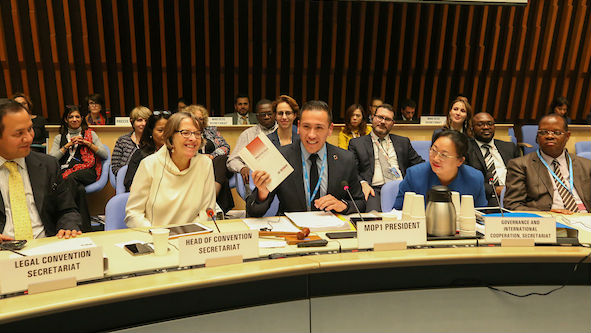
The Meeting of the Parties (MOP1) to a new global treaty to fight the tobacco illicit market closed its first session on Wednesday after taking the first steps towards the creation of a monitoring system to track and trace the movement of tobacco products.
The three-day session was the first gathering of the Parties to the Protocol to Eliminate Illicit Trade in Tobacco Products, following the treaty’s entry into force on 25 September.
“This meeting was a historic occasion and a critical turning point for tobacco control and public health,” said Carlos Cisneros, MOP1 President and Ecuador Undersecretary of Health Promotion. “The illicit tobacco trade jeopardizes both public health and tobacco control efforts. We must act together to fight the illicit tobacco trade with a common framework.”
The MOP1 discussions drew the participation of 44 State Parties to the Protocol and 56 State non-Parties, along with representatives from civil society and intergovernmental organizations. Delegations addressed key technical and operational procedures for implementing the Protocol, which aims to strengthen tobacco control efforts under the WHO Framework Convention for Tobacco Control (FCTC).
“We have taken the first steps on a journey to combat the illicit tobacco trade,” said Dr. Vera da Costa e Silva, Head of the FCTC Secretariat. “Illicit trade accounts for one out of 10 cigarettes consumed. This makes cigarettes more affordable and available and increases consumption among youth and vulnerable populations.”
Delegates at MOP1 reached an agreement to create a working group to produce a comprehensive report to showcase good practices and experiences of State Parties in the implementation of tracking and tracing systems, and to prepare the conceptual work in view of creating a global information-sharing focal point to combat illicit tobacco trade.
“Establishing tracking and tracing systems will allow Parties to have a tighter control on the circulation of tobacco products and ensure that taxation is applied as intended,” said Dr. da Costa e Silva.
The international tobacco illicit market promotes the evasion of taxes on tobacco products, which has resulted in substantial losses in government revenue, while increasing tobacco profits.
Parties at MOP1 agreed to work towards greater collaboration with government agencies, and regional and international bodies in charge of law enforcement and customs, which will be key to effective implementation of the Protocol.
To date, 48 Parties have joined the Protocol, and two-thirds of the Parties to the WHO FCTC have enacted or strengthened national legislation aimed at tackling illicit trade in tobacco products.
The Protocol provides a comprehensive set of tools to fight illicit trade, including establishment of a global monitoring system to track and trace the movement of tobacco products and updates on their legal status. The Protocol also includes measures to promote international cooperation, including sanctions and law enforcement.
For further information and media requests, please contact:
Pascal Gysel, FCTC Media & Communications Officer
Email: mediafctc@who.int
+41 78 663 37 30